
The Ragtime revival currently touring the U.S. may not be the already trimmed-down Marcia Milgrom Dodge-version that scored the director-choreographer a 2010 Tony nomination. (The non-Equity cast is even smaller by 25%, the creative team behind its much scaled-down production design is new for the tour, and Lynn Ahrens and Stephen Flaherty’s songs are performed to prerecorded tracks.) Nonetheless, under Dodge’s inspired hand, this Ragtime turns out to be every bit as powerful as any of the half-dozen I’ve now seen.
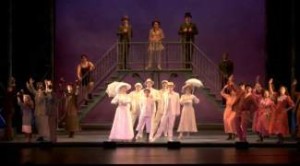 Based on E. L. Doctorow’s 1975 novel, with a Tony-winning book by Terrence McNally and a Tony-winning score by Ahrens and Flaherty, Ragtime takes us back a century to an era of historic change in the United States, a time when the country found itself divided between The Haves (well-to-do early 20th-Century White Anglo-Saxon Protestants like Henry Ford and J.P. Morgan, both of whom are supporting characters in Ragtime) and The Have-Nots (working-lass African-Americans and fresh-off-the-boat immigrants).
Based on E. L. Doctorow’s 1975 novel, with a Tony-winning book by Terrence McNally and a Tony-winning score by Ahrens and Flaherty, Ragtime takes us back a century to an era of historic change in the United States, a time when the country found itself divided between The Haves (well-to-do early 20th-Century White Anglo-Saxon Protestants like Henry Ford and J.P. Morgan, both of whom are supporting characters in Ragtime) and The Have-Nots (working-lass African-Americans and fresh-off-the-boat immigrants).
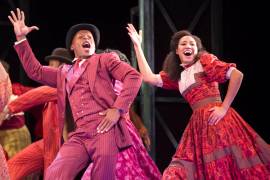 The Haves may have wanted to believe, as they harmonize in Ragtime’s opening number, that “there were no Negroes and there were no immigrants,” but Ragtime’s fictional Mother, Father, Younger Brother, and Little Boy were soon to find out otherwise.
The Haves may have wanted to believe, as they harmonize in Ragtime’s opening number, that “there were no Negroes and there were no immigrants,” but Ragtime’s fictional Mother, Father, Younger Brother, and Little Boy were soon to find out otherwise.
Mother (Kate Turner) takes in an African-American baby found in her garden along with the child’s unwed mother Sarah (Leslie Jackson). Younger brother (Donald Coggin) becomes inspired by anarchist Emma Goldman (Sandy Zweir) to revolt against the status quo, and not long afterwards joins Sarah’s lover, musician Coalhouse Walker, Jr. (Chris Sams), in the forced takeover of the Morgan Library. And Mother’s life eventually becomes intertwined with those of immigrant Tateh (Matthew Curiano) and his young daughter Little Girl (Cara Myers) in addition to those already present in her own: Father (Troy Bruchwalski), Grandfather (Bob Marcus), and Little Boy (Colin Myers).
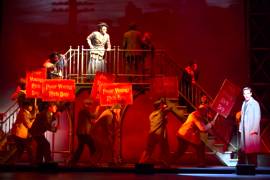 Ragtime manages to be both epic in its power ballads and its cast of well-known historical figures like Ford (John Anker Bow), Morgan (Todd Berkich), Harry Houdini (Mark Alpert), Evelyn Nesbitt (Jillian Van Niel), Admiral Perry (Berkich), and Booker T. Washington (Jeffrey Johnson II) and personal in its focus on Coalhouse’s efforts to win Sarah back, on Tateh and his daughter’s first steps towards becoming Americans, and on Mother’s growing disillusionment in her marriage.
Ragtime manages to be both epic in its power ballads and its cast of well-known historical figures like Ford (John Anker Bow), Morgan (Todd Berkich), Harry Houdini (Mark Alpert), Evelyn Nesbitt (Jillian Van Niel), Admiral Perry (Berkich), and Booker T. Washington (Jeffrey Johnson II) and personal in its focus on Coalhouse’s efforts to win Sarah back, on Tateh and his daughter’s first steps towards becoming Americans, and on Mother’s growing disillusionment in her marriage.
The original Broadway production featured a cast of fifty, Milgrim’s 2010 revival cut this down to thirty-three, and the current tour trims it even further to a mere twenty-five, but with featured characters filling in as part of the ensemble and ensemble members crossing socio-economic lines, only rarely is this noticeable or (in the case of blacks debarking at Ellis Island alongside white Europeans) distracting, not with every single cast member doing terrific—and in some cases absolutely breathtaking—work.
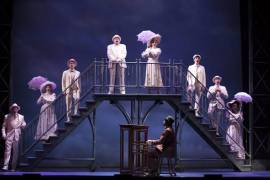 Spectacle this touring Ragtime may lack (Kevin Depinet’s scenic design consists almost entirely of a pair of mobile metal staircases backed by Mike Tutaj’s watercolor-like projections), but the simplified design manages to work, particularly as lit to gorgeous effect by Mike Baldassari. Gail Baldoni’s multitude of turn-of-the-20th-century costumes and Dave Boba’s period wig/hair design could easily grace a Broadway stage. Most miraculous of all, sound designer Craig Cassidy manages to make a canned orchestra sound live, or the next-best-thing to.
Spectacle this touring Ragtime may lack (Kevin Depinet’s scenic design consists almost entirely of a pair of mobile metal staircases backed by Mike Tutaj’s watercolor-like projections), but the simplified design manages to work, particularly as lit to gorgeous effect by Mike Baldassari. Gail Baldoni’s multitude of turn-of-the-20th-century costumes and Dave Boba’s period wig/hair design could easily grace a Broadway stage. Most miraculous of all, sound designer Craig Cassidy manages to make a canned orchestra sound live, or the next-best-thing to.
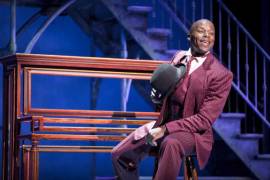 Under Steven M. Bishop’s expert musical direction/supervision, each and every cast member sings superbly, beginning with Sams’ magnificent Coalhouse, Jackson’s glorious Sarah, Curiano’s dynamic Tateh, and Coggin’s impassioned Younger Brother, the foursome giving the evening’s most impressive performances in a production filled with topnotch performers.
Under Steven M. Bishop’s expert musical direction/supervision, each and every cast member sings superbly, beginning with Sams’ magnificent Coalhouse, Jackson’s glorious Sarah, Curiano’s dynamic Tateh, and Coggin’s impassioned Younger Brother, the foursome giving the evening’s most impressive performances in a production filled with topnotch performers.
Turner’s lovely Mother, Bruchwalski’s stuffy father, Marcus’s codgerly Grandfather, and the Myers siblings’ delightful Little Boy and Little Girl all do fine work, as does the entire cast, which also includes John Barsoian (Stanford White, Charles S. Whitman), Joe Callahan (Willie Conklin), Aneesa Folds (Sarah’s Friend), Colleen Gallagher, Daniel Gorham, Milika Griffiths, Alec Mathieson (Harry T. Thaw), JoNathan Michael (Matthew Henson), Heidi Santiago (Brigit), and Cecilia Snow, whose triple-threat talents get shown off to memorable effect in one thrilling Dodge-choreographed dance sequence after another.
Vocal highlights are far too many to mention them all, but standouts include the stirring “Till We Reach That Day” the grand finale reprise of “Wheels Of Your Dream,” Turner’s soaring “Back To Before,” Jackson’s gut-wrenchingly beautiful “Your Daddy’s Son” and the sublimely-sung Sams-Jackson duet of “Sarah Brown Eyes.”
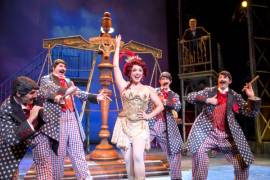 Van Niel and Coggin’s deliciously cheeky “Crime Of The Century,” Curiano’s rollicking “Buffalo Nickel Photoplay Inc.” and his lilting “Gliding,” Turner’s and Curiano’s poignant “Our Children,” and Zwier’s electrifying “The Night That Goldman Spoke At Union Square” and “He Wanted To Say” are all worth worthy of mention as are Folds’ powerful solo moments in “Till We Reach That Day” and the baseball-inspired comic relief of “What A Game.”
Van Niel and Coggin’s deliciously cheeky “Crime Of The Century,” Curiano’s rollicking “Buffalo Nickel Photoplay Inc.” and his lilting “Gliding,” Turner’s and Curiano’s poignant “Our Children,” and Zwier’s electrifying “The Night That Goldman Spoke At Union Square” and “He Wanted To Say” are all worth worthy of mention as are Folds’ powerful solo moments in “Till We Reach That Day” and the baseball-inspired comic relief of “What A Game.”
Josh Walden is associate director/choreographer. Arthur J.M. Callahan is company manager and J. Andrew Blevins is production stage managers. Jordan and Leilani Santiago alternate with the Myers as Little Boy and Little Girl.
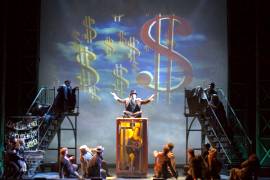 As Ragtime continues to crisscross the country over the next several months, audiences from Utica to Atlanta to Toledo to Dallas will be able to experience what I did at the Cerritos Center For The Performing Arts. Scaled-down this revival may be, but in power and impact it delivers the goods.
As Ragtime continues to crisscross the country over the next several months, audiences from Utica to Atlanta to Toledo to Dallas will be able to experience what I did at the Cerritos Center For The Performing Arts. Scaled-down this revival may be, but in power and impact it delivers the goods.
–Steven Stanley
April 2, 2016
Tags: Ahrens & Flaherty, Cerritos Center For The Performing Arts, E.L. Doctorow, Los Angeles Theater Review, Terrence McNally



 Since 2007, Steven Stanley's StageSceneLA.com has spotlighted the best in Southern California theater via reviews, interviews, and its annual StageSceneLA Scenies.
Since 2007, Steven Stanley's StageSceneLA.com has spotlighted the best in Southern California theater via reviews, interviews, and its annual StageSceneLA Scenies.







 COPYRIGHT 2025 STEVEN STANLEY :: DESIGN BY
COPYRIGHT 2025 STEVEN STANLEY :: DESIGN BY